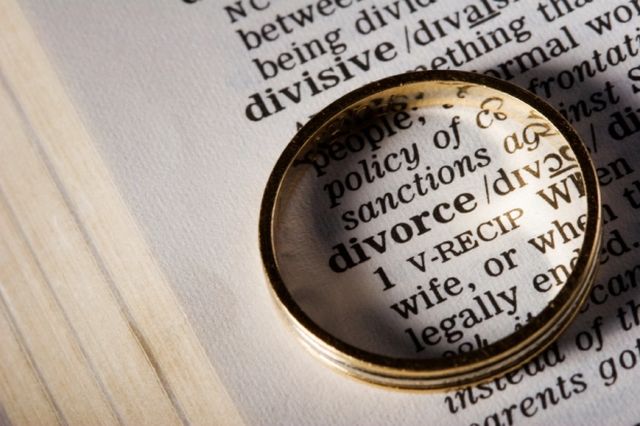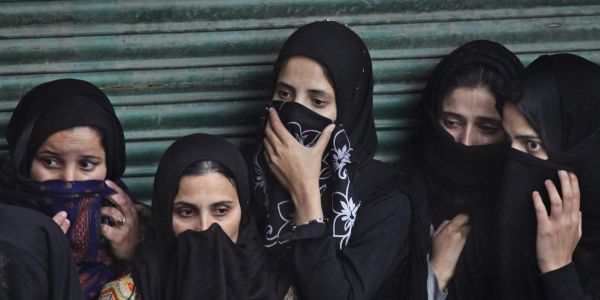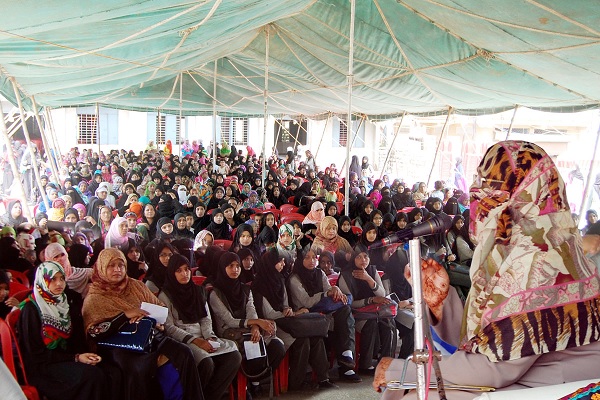
by admin | May 25, 2021 | News
 New Delhi : The Holy Prophet Mohammad (SAW) had declared divorce to be the most disliked among the lawful things in the eyes of God as it broke the marital tie which is fundamental to family life in Islam, the Supreme Court yesterday said.
New Delhi : The Holy Prophet Mohammad (SAW) had declared divorce to be the most disliked among the lawful things in the eyes of God as it broke the marital tie which is fundamental to family life in Islam, the Supreme Court yesterday said.
Justice R F Nariman, who wrote one of the two separate majority judgements, said divorce not only disrupted the marital tie between man and woman, but had severe psychological and other repercussions on the children from such marriage.
Justice Nariman, whose views were concurred with by Justice U U Lalit, noted that marriage in Islam was a contract, and like other contracts, it could be terminated under certain circumstances.
“There is something astonishingly modern about this no public declaration is a condition precedent to the validity of a Muslim marriage, nor is any religious ceremony deemed absolutely essential though they are usually carried out,” he said.
“Apparently, before the time of Prophet Mohammad (SAW), the pagan Arab was absolutely free to repudiate his wife on a mere whim, but after the advent of Islam, divorce was permitted to a man if his wife by her indocility or bad character rendered marital life impossible,” Justice Nariman said.
In the absence of good reason, no man can justify a divorce “for he then draws upon himself the curse of God.
“Indeed, Prophet Mohammad (SAW) had declared divorce to be the most disliked of lawful things in the sight of God. The reason for this is not far to seek. Divorce breaks the marital tie which is fundamental to family life in Islam,” Justice Nariman said.
The five-judge Constitution bench, by a majority of 3:2 in which Chief Justice J S Khehar was in minority, said the practice of “‘talaq-e-biddat’ triple talaq is set aside“.
The two separate judgements, written for majority by Justices Kurian Joseph and R F Nariman, did not concur with the CJI and Justice S Abdul Nazeer that ‘triple talaq’ was a part of religious practice and the government should step and come out with a law.
—NNN-PTI

by admin | May 25, 2021 | Opinions
 By Jawed Khurshid for Maeeshat
By Jawed Khurshid for Maeeshat
Ever since the BJP firmly ensconced itself on the pedestal of power, it remained busy flirting with issues that is closer to Muslim’s psyche. Beef, Vande Mataram, Ghar waapsi (a RSS and VHP led drive to proselytize Muslims), Article 370 and Uniform Civil Code, to name a few, keep Muslims on their toes. Raking up issues such as triple talaqs at one go is tantamount to tinkering with beehive. The obvious result would be cacophony inside the parliament and shrill protests outside on streets, alleys and even inside the safe four-walls of our very homes, which is routinely observed almost every day.
A couple of years ago, a Quranic concept of phased talaq was being tried to put in place by those who are deft in Islamic jurisprudence. The various Islamic denominations revolted as if seem to have convulsed with trauma – post phased talaq vaccine. This has made almost vertical rift in the clergy – the moderates welcomed it as departure from the oppressive triple talaq at one go. The more orthodox and rigid clergies fumed with rage, threatened to stall the AIMPLB’s progressive initiative. Among many in the erstwhile political dispensation, it was the horror Shah Banu revisited which had shorn the Congress of its cutting edge. Ever since, the Congress was sucked into the whirlpool of obscurity. Now, as they are not on the treasury benches, they are enjoying the things from the gallery, watching the ruling BJP being cornered with caustic smile.
The present political dispensation, though a right wing party, too cannot afford to tinker with the cork that prevents the djinn (demon) of Muslim rage to escape from the proverbial bottle.
Literally, nikah implies merging of two opposite sex. Once the two individuals marry they get tied to a contractual bound, which is assumed to be an everlasting bound. To breach this bound is akin to seperating two vital organs connected by life supporting system. It is an extremely delicate surgery. The surgical method applied to separate the two is the concern of scholars deft in Islamic jurisprudence and Shariat as well as Fiqeh.
In Muslim Personal Law, there is a provision of triple talaq – or the thrice recitals of talaq, talaq, talaq— which makes the separation legal (even if it is done in inebriated condition!).
However, there are two almost diametrically opposite schools of thought which interpret this crucial issue into different light. The supporter of liberal school and the president of All India Ulema Mashaikh Council, Allama Bunai Noaim Hasani when asked, Why talaq is so easy in Shariat and Why a girl who sacrifices her parental home and hearth is thrown into the vortex of arbitrary triple talaq, said, there is no scope for such talaq in Shariat, because Shariat cannot be amended or changed. It is the Fiqeh law that can be amended in the light of Holy Quran. Fiqeh laws were formulated by Islamic scholars in the light of Shariat (Holy Quran and Hadith) which govern the lives of Muslims. There are seven different Fiqehs such as Hanafi, Slafi, Shafei, etc. The fatwas are given in the light of Fiqeh.
Shariyat doesn’t permit such divorce. This article relates to Fiqeh , not Shariat. The Fiqeh that a majority of Sunnis follow is Fiqeh Hanafi which allows such talaq. However, few Islamic sects such as, Shia and Ahle-Hadith condemn such unethical practice which has became means to traumatise Muslim women. Unfortunately in India, roughly 70% Muslims still believe in triple talaq.
A couple of years ago, AIMPLB proposed to draft such nikahnama which had the provision of increment in the amount of Meher (alimony). This was mooted to stem the rot. Unfortunately it met with vehement protests, both from the liberals as well as the orthodox sections of Muslim society.
Most believe it has an ominous portent. It is like resorting to one evil to remove the other. They contend, this will make nikah more expensive and difficult for millions of Muslims those who are financially at the edge. Besides, this could trigger rape and violence, a natural corollary of such myopic policy. And thus would be contrary to the spirit of Islam, which warns us against making nikah difficult.
At times, the groom’s in-laws employ coercive methods to get his (husband’s) approval to divorce his wife. Does Shariat allow talaq under such circumstances? Hasani said only Fiqeh Hanafi permits such talaqs. Other Fiqehs have no such provisions.
Many believe talaq is damn easy in Fiqeh Hanafi. Ironically, this is a misconceived notion. Even in Fiqeh Hanafi talaq is not that easy as it is being portrayed. There is an alternative method of giving talaq called Leaan. Leaan can be understood by the following illustration: If a man happens to find his wife in a compromising position with another person (adultery), even under such critical condition Fiqeh Hanafi does not permit the husband to divorce his wife on the spot. The dispute must be placed before a Qazi (Judge of a Islamic Shariyat court). The qazi after hearing both the parties gives ruling that must be acceptable to both the warring groups.
The yawning problem of triple talaq at one go has tarnished the face of Islam and peeved a lot many women who find themselves at the receiving end of their husband’s haughtiness. Under such circumstances, one may contemplate how to rectify this? How could the Muslim society be bailed out from such arbitrary talaqs?
The solution to such arbitrary talaqs is mentioned by Allah in the Holy Quran in only three words in its second verse of Sura Talaq (Talaq Chapter). It says, Washhadu zu adlim minkum — “O mankind! When thou give talaq to thy wives make sure of making two judicious witnesses to this.” Thus, it becomes ample clear that any judicious and God-fearing witness won’t be a party to such imprudent act.

by admin | May 25, 2021 | News

Dr. Asma Zehra, executive committee member of All India Muslim Personal Law Board, (AIMPLB), addressing a public meeting of Muslim women in Bhopal on the topic entitled “Tahaffuz-e-Shariat aur Khwateen ki ZimmedariyaN”.
Muslims to oppose interference in personal laws spiritedly: Dr. Asma Zehra
By Pervez Bari
Bhopal 🙁 Maeeshat News) “The Muslim community will not lie low but oppose tooth and nail if any interference is made in their personal laws by the government of the day. The men and womenfolk of the community would struggle together, shoulder to shoulder, if need be, spiritedly and peacefully against the forces which are hell bent to unnecessary meddle with the Muslim personal laws. We strongly condemn the moves of the BJP-led NDA government at the Centre backed by the RSS for trying to interfere in the Muslim personal laws and their nefarious design to formulate the Uniform Civil Code”.
This was asserted by Dr. Asma Zehra, executive committee member of All India Muslim Personal Law Board, (AIMPLB), while addressing media persons here on Wednesday. She was here in the State capital from Hyderabad to address a public meeting of Muslim women on the topic entitled “Tahaffuz-e-Shariat aur Khwateen ki ZimmedariyaN” (Protection of Islamic law and responsibilities of women).
Dr. Asma Zehra said: “India is a Secular Democratic country. Muslims are guaranteed the right to freedom of religion in the Indian Constitution. Different religious groups in our country follow their respective personal laws. Muslim Personal law is based on the Holy Book Quran and the Sunnah of the Holy Prophet’s Hadith (sayings). Islamic jurisprudence is a broad and meaningful subject”.
“We the Muslims of this country unitedly oppose any such effort to revoke the Muslim Personal Law which is an integral part of the Constitution. We the 10 crore Muslim Women of India will try to protect the Muslim Personal Law”, she added.
She said the real issues facing the Indian society nowadays are female feticide, female infanticide, dowry harassment, domestic violence and women’s safety and security. However, the irony is that these vital issues are overlooked and “Talaq” (Divorce) is debated. Forty per cent of wives in India are facing domestic violence by husband and in-laws, she added.
Dr. Zehra expressed her anguish over the much hype being created in the media and the society over the issue of triple “Talaq” in Islam. Through this it is being portrayed that on the issue of divorce Islam is anti-woman gender biased and against fundamental rights of women. On the contrary the reality is that in Islam women are given equal rights in every of walk of life, she emphasized. Recently the issue of right of divorce in Muslim Personal Law is debated and discussed in media by people who have scant knowledge of the subject. Instead of being realistic and sincerely concerned about the Muslim women’s issues, the focus is to degrade one particular community and attack their personal laws, she lamented.
She said that “Talaq” is the most unpleasant act allowed in Islam. Every religion has a code for divorce where men and women are given the right to get separated in case of unsuccessful marriages. Marriages in the Muslim community are 97 per cent successful and Muslim women are safe and comfortable in the Muslim Personal Law. In Islam marriage is a contract, a bond, in which both partners enjoy equal freedom and live in peace and happiness. In case of dispute the doors of divorce are kept open only to make life easy and relieve each partner of torture and suffering.
She said that recent articles giving the reference of Census 2011 in which it is shown that divorcees are higher percentage in Muslim community are old statistical data. Desertion and abandoning is very less in Muslim community and the burden of children’s upkeep is not on the wife. Her Husband (Father of children) is the sole responsible person for children’s upbringing and maintenance. In fact the wife walks out free after divorce. She is free to live her own life according to her will and is legally open to re-marriage, if she desires so. Marriage is a contractual agreement in Islam and not a sacrament (Janam Janam ka Bandhan).
Dr. Zehra pointed out that according to journalist Apoorva Dutt’s report on divorce published in Hindustan times 4th January 2015, the divorce rate is very low in Indian community, 13 cases per 1000 as compared to 500 per 1000 in United States. While India has no official Central or state-wise registry of divorce, family court official says the number of cases has doubled or even tripled in cities such as Mumbai, Delhi, Bengaluru, Kolkata, and Lucknow over past five years. So, this is basically an issue of metro cities.
She questioned as to why there is an effort by the media to tarnish and damage the image of the Muslim community. Why the Muslim community has to face the blame of gender bias and gender discrimination. Islam elevated the position of Muslim women and gave her a respectable position in the society. Muslim women are socially more empowered than women of any community because of strong family system, she argued. She appealed the media not to present false figures and numbers and try to be realistic with the issues concerning the Muslim community.
She recalled that Justice T.S. Thakur, Chief Justice of the Supreme Court, has rightly said: “Court cannot find a solution to all the ills in the country. We cannot order that all corruption in India be stopped. We cannot order that murders should come to an end. All abductions should come to an end….…”
“Similarly, we cannot expect the Supreme Court to pass a ruling and force a husband to continue his marital relationship with wife in the face of discord between them. Even after the court order if the man pronounces “Talaq” in three sittings, will the divorcee woman get relief under the court of law. All these issues require hard work of social reforms on the ground level by the reformists and social activists”, she opined.
Dr. Zehra lamented that many so-called Muslim women organisations and “Andolans” (campaigns) have erupted recently who lack basic understanding of the Holy Quran and Hadith. They fail to understand that in cases of serious differences between husband and wife, the separation is a safe exit.
Arif Masood of Bhopal, another executive committee member of the All India Muslim Personal Law Board, was present during the Press conference of Dr. Asma Zehra.
Meanwhile, later in the afternoon addressing a public meeting of Muslim women on the topic entitled “Tahaffuz-e-Shariat aur Khwateen ki ZimmedariyaN” Dr. Asma Zehra exhorted them to follow the teachings of Islam as enshrined in the holy Quran and Hadith in letter and spirit. She appealed them not to get distracted by the false propaganda by the so-called women’s groups and “Andolans”.
She called upon Muslim women to follow the Shariah laws in their day-to-day life and inculcate moral values in their children according to Sunnah of Prophet Muhammad (PBUH) so that they are rewarded handsomely by Allah in Akhirat. She cautioned them to be ready for any struggle to desist any interference in matters of “Talaq” and other personal laws if need arose.
The public meeting was presided over by Maulana Peer Saeed Miyan Mujaddidi, Rector, Dar-ul-Uloom, Taj-ul-Masajid, Bhopal. Arif Masood, who is also a Congress party leader, was present at the public meeting, too spoke on the occasion.
Maulana Peer Saeed Miyan Mujaddidi in his presidential address urged Muslim women to avoid going to courts in matters of matrimonial discord or disputes. They should approach first family elders to solve their issues to save their marriage or then go to Qazis to settle their cases, he added.

 New Delhi : The Holy Prophet Mohammad (SAW) had declared divorce to be the most disliked among the lawful things in the eyes of God as it broke the marital tie which is fundamental to family life in Islam, the Supreme Court yesterday said.
New Delhi : The Holy Prophet Mohammad (SAW) had declared divorce to be the most disliked among the lawful things in the eyes of God as it broke the marital tie which is fundamental to family life in Islam, the Supreme Court yesterday said.

